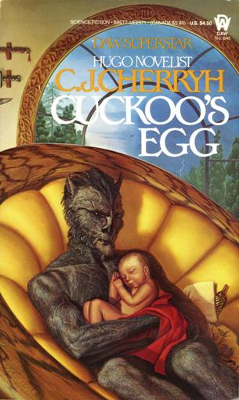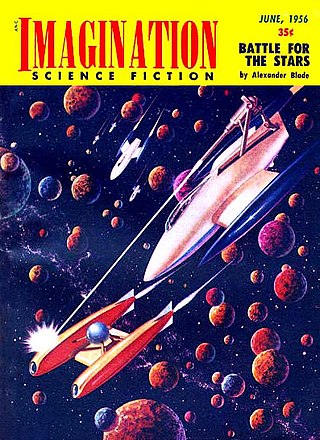
Starship Troopers is a military science fiction novel by American writer Robert A. Heinlein. Written in a few weeks in reaction to the US suspending nuclear tests, the story was first published as a two-part serial in The Magazine of Fantasy & Science Fiction as Starship Soldier, and published as a book by G. P. Putnam's Sons on November 5, 1959.

Alien invasion or space invasion is a common feature in science fiction stories and film, in which extraterrestrial lifeforms invade the Earth to exterminate and supplant human life, enslave it, harvest people for food, steal the planet's resources, or destroy the planet altogether. It can be considered as a science-fiction subgenre of the invasion literature, expanded by H. G. Wells's seminal alien invasion novel The War of the Worlds, and is a type of "first contact" science fiction.
Wil McCarthy is an American science fiction novelist, president and co-founder of RavenBrick, and the science columnist for Syfy. He currently resides in Colorado. Rich Man's Sky won the 2022 Prometheus Award.

Military science fiction is a subgenre of science fiction and military fiction that depicts the use of science fiction technology, including spaceships and weapons, for military purposes and usually principal characters who are members of a military organization, usually during a war; occurring sometimes in outer space or on a different planet or planets. It exists in a range of media, including literature, comics, film, television and video games.

Alien Nation is a science fiction police procedural television series in the Alien Nation franchise. Adapted from the 1988 Alien Nation movie, it stars Gary Graham as Detective Matthew Sikes, a Los Angeles police officer reluctantly working with "Newcomer" alien Sam "George" Francisco, played by Eric Pierpoint. Sikes also has an on again-off again flirtation with a female Newcomer, Cathy Frankel, played by Terri Treas.
The Uplift Universe is a fictional universe created by American science fiction writer David Brin. A central feature in this universe is the process of biological uplift.
The Noon Universe is a fictional future setting for a number of hard science fiction novels written by Arkady and Boris Strugatsky. The universe is named after Noon: 22nd Century, chronologically the first novel from the series and referring to humanity reaching its noon in the 22nd century.

Marooned in Realtime is a 1986 murder mystery and time-travel science fiction novel by American writer Vernor Vinge, about a small, time-displaced group of people who may be the only survivors of a technological singularity or alien invasion. It is the sequel to the novel The Peace War (1984) and the novella The Ungoverned (1985). Both novels and the novella were collected in Across Realtime.
The Worldwar series is the fan name given to a series of eight alternate history science fiction novels by Harry Turtledove. Its premise is an alien invasion of Earth during World War II, and includes Turtledove's Worldwar tetralogy, as well as the Colonization trilogy, and the novel Homeward Bound. The series' time span ranges from 1942 to 2031. The early series was nominated for a Sidewise Award for Alternate History in 1996.
Many of the tropes of science fiction can be viewed as similar to the goals of transhumanism. Science fiction literature contains many positive depictions of technologically enhanced human life, occasionally set in utopian societies. However, science fiction's depictions of technologically enhanced humans or other posthuman beings frequently come with a cautionary twist. The more pessimistic scenarios include many dystopian tales of human bioengineering gone wrong.

Old Man's War is a military science fiction novel by American writer John Scalzi, published in 2005. His debut novel was nominated for the Hugo Award for Best Novel in 2006.

Cuckoo's Egg is a science fiction novel by American writer C. J. Cherryh, which introduces a fictional race raising a human boy. It was published by DAW Books in 1985, and there was also a limited hardcover printing by Phantasia Press in the same year. The book was nominated for the Hugo Award and longlisted the Locus Award for Best Novel. It was later reprinted along with Cherryh's novel Serpent's Reach in the 2005 omnibus volume The Deep Beyond.
Several themes recur throughout the works of American science fiction and fantasy author C. J. Cherryh.

Ancient astronauts have been addressed frequently in science fiction and horror fiction. Occurrences in the genres include:
The anthropologist Leon E. Stover says of science fiction's relationship to anthropology: "Anthropological science fiction enjoys the philosophical luxury of providing answers to the question "What is man?" while anthropology the science is still learning how to frame it". The editors of a collection of anthropological SF stories observed:
Anthropology is the science of man. It tells the story from ape-man to spaceman, attempting to describe in detail all the epochs of this continuing history. Writers of fiction, and in particular science fiction, peer over the anthropologists' shoulders as the discoveries are made, then utilize the material in fictional works. Where the scientist must speculate reservedly from known fact and make a small leap into the unknown, the writer is free to soar high on the wings of fancy.

The War of the Worlds is a science fiction novel by English author H. G. Wells. It was written between 1895 and 1897, and serialised in Pearson's Magazine in the UK and Cosmopolitan magazine in the US in 1897. The full novel was first published in hardcover in 1898 by William Heinemann. The War of the Worlds is one of the earliest stories to detail a conflict between humankind and an extraterrestrial race. The novel is the first-person narrative of an unnamed protagonist in Surrey and his younger brother who escapes to Tillingham in Essex as London and southern England is invaded by Martians. It is one of the most commented-on works in the science fiction canon.

The Long Result is a 1965 science fiction novel by British writer John Brunner.

Space opera is a subgenre of science fiction that emphasizes space warfare, with use of melodramatic, risk-taking space adventures, relationships, and chivalric romance. Set mainly or entirely in outer space, it features technological and social advancements in faster-than-light travel, futuristic weapons, and sophisticated technology, on a backdrop of galactic empires and interstellar wars with fictional aliens, often in fictional galaxies. The term does not refer to opera music, but instead originally referred to the melodrama, scope, and formulaicness of operas, much as used in "horse opera", a 1930s phrase for a clichéd and formulaic Western film, and "soap opera", a melodramatic television series. Space operas emerged in the 1930s and continue to be produced in literature, film, comics, television, video games and board games.

Biology appears in fiction, especially but not only in science fiction, both in the shape of real aspects of the science, used as themes or plot devices, and in the form of fictional elements, whether fictional extensions or applications of biological theory, or through the invention of fictional organisms. Major aspects of biology found in fiction include evolution, disease, genetics, physiology, parasitism and symbiosis (mutualism), ethology, and ecology.












